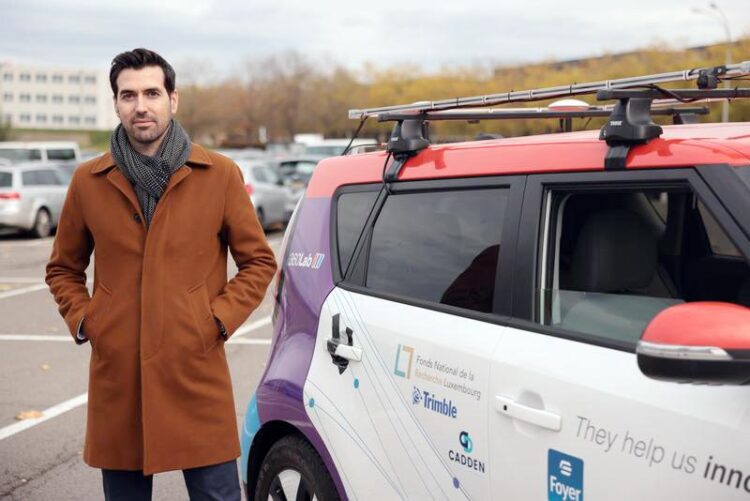First autonomous car in Luxembourgish traffic

Prof. Raphaël Frank and the Car
Credit: Christian Wilmes
The University of Luxembourg’s Interdisciplinary Centre for Security, Reliability and Trust (SnT) demonstrated its autonomous car in live traffic on Kirchberg today, Thursday 3 November 2022. This represents the first time a single-family autonomous car has joined the flow of traffic in Luxembourg with members of the public as passengers.
This autonomous car is the test platform for navigation technologies and high definition (HD) maps being researched at SnT’s 360Lab. The demonstration is the culmination of five years of research work by the 360Lab team, led by Prof. Raphaël Frank. The 360Lab is the first thematic research laboratory focusing on smart mobility in the country, and it serves as an umbrella to conduct strategic and collaborative research in the broader area of mobility innovation.
The 360Lab’s research is crucial to the future of autonomous driving in Luxembourg as it is developing HD maps of the region, which provide information that road signs and markings traditionally give to drivers as they navigate to their destination. HD maps are the basis for autonomous navigation. These are exponentially more detailed than standard definition (SD) maps, commonly used by traditional navigation services’ found in cars and mobile devices. The map for the demo was completed in partnership with a San Francisco based start-up, Civil Maps, specialised in providing HD maps for automated mobility.
Beyond the technical research, there are also many logistics involved in researching autonomous navigation. As part of their research, the team needed to gain authorisation for the single-family car to drive on Luxembourgish roads, trailblazing the regulatory path for autonomous driving in the country.
“Autonomous driving holds the potential to create a mobility ecosystem that is both safer and more sustainable. Full autonomy will be a paradigm shift in mobility, improving traffic and reducing congestion by reducing the number of vehicles,” says Prof. Raphaël Frank. “Our mission is to have a research platform where we demonstrate the technology of autonomous mobility that we can use for research and education. Today’s demo achieves this goal as it is the first-time members of the public get to experience the functionality of the car first-hand.”
Media Contact
Raphael Cayrol
University of Luxembourg
raphael.cayrol@uni.lu
Office: 352-466-644-9451
All latest news from the category: Transportation and Logistics
This field deals with all spatial and time-related activities involved in bridging the gap between goods and people, including their restructuring. This begins with the supplier and follows each stage of the operational value chain to product delivery and concludes with product disposal and recycling.
innovations-report provides informative reports and articles on such topics as traffic telematics, toll collection, traffic management systems, route planning, high-speed rail (Transrapid), traffic infrastructures, air safety, transport technologies, transport logistics, production logistics and mobility.
Newest articles

NASA: Mystery of life’s handedness deepens
The mystery of why life uses molecules with specific orientations has deepened with a NASA-funded discovery that RNA — a key molecule thought to have potentially held the instructions for…

What are the effects of historic lithium mining on water quality?
Study reveals low levels of common contaminants but high levels of other elements in waters associated with an abandoned lithium mine. Lithium ore and mining waste from a historic lithium…

Quantum-inspired design boosts efficiency of heat-to-electricity conversion
Rice engineers take unconventional route to improving thermophotovoltaic systems. Researchers at Rice University have found a new way to improve a key element of thermophotovoltaic (TPV) systems, which convert heat…



